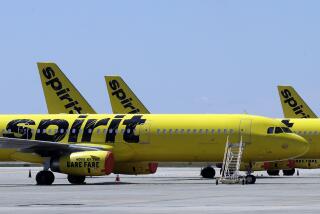Judge Blocks TWA Plan to Buy Back Debt
- Share via
NEW YORK — A federal judge Friday blocked Trans World Airlines’ offer to buy a vast portion of its estimated $1.37-billion debt at a discount, a ruling that could push the troubled airline closer to bankruptcy.
TWA’s effort to buy its way out of debt at a fraction of the value of its bonds is a crucial element of the airline’s strategy to stay in business without seeking Chapter 11 bankruptcy protection.
The airline, owned by takeover investor Carl C. Icahn, is one of the most troubled carriers and has been especially weakened by the recession and the Persian Gulf crisis that crimped overseas travel.
But analysts maintained that this latest development was not too significant. They said that before Icahn’s plans for reorganization are complete, there will be many developments in the courts.
TWA, headquartered in suburban Mt. Kisco, N.Y., was declining comment on Friday’s decision.
Judge Gerard Goettel at a federal court in White Plains, N.Y., granted a preliminary injunction at the request of Fleet National Bank, one of the airline’s many creditors.
TWA’s tender offer for debt, set to expire June 21, is a bid by the airline to buy back large chunks of debt at a discount, using money obtained by the recent $445 million sale of TWA London routes to American Airlines.
TWA had offered to pay 17.5 cents on the dollar for a portion of the bonds representing $670 million of its total outstanding debt.
Fleet, a senior noteholder, argued that if the junior bondholders are paid, even at 17.5 cents on the dollar, there will be less available to satisfy a judgment in favor of Fleet and others.
Senior debt is considered more valuable than junior debt because it takes priority for repayment.
Goettel’s order bars TWA from purchasing the junior bondholders’s debt until it has paid all defaults on its senior notes. The judge said that if the junior bondholders were to be paid and the payment was later found to have been inappropriate, it would be impractical to track them all down and get the money back.
He called TWA’s tender offer an “attempt to forestall bankruptcy by announcing a highly publicized offer to purchase a vast portion of its outstanding debt.”
TWA has said that unless it can buy back the bonds and win major concessions from labor unions, it will probably either go into bankruptcy court to seek protection from creditors or even go out of business.
Airline analyst Raymond E. Neidl suggested that TWA might be able to stay out of trouble by offering the junior noteholders something other than cash.
“These guys are the most junior,” Neidl said. “They are the least positioned to be able to negotiate.”
More to Read
Inside the business of entertainment
The Wide Shot brings you news, analysis and insights on everything from streaming wars to production — and what it all means for the future.
You may occasionally receive promotional content from the Los Angeles Times.










